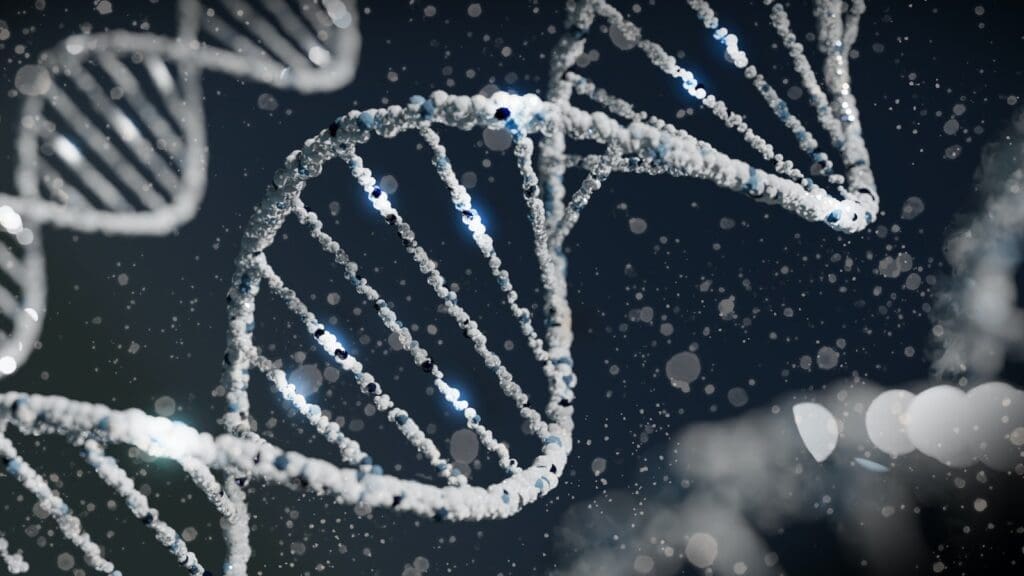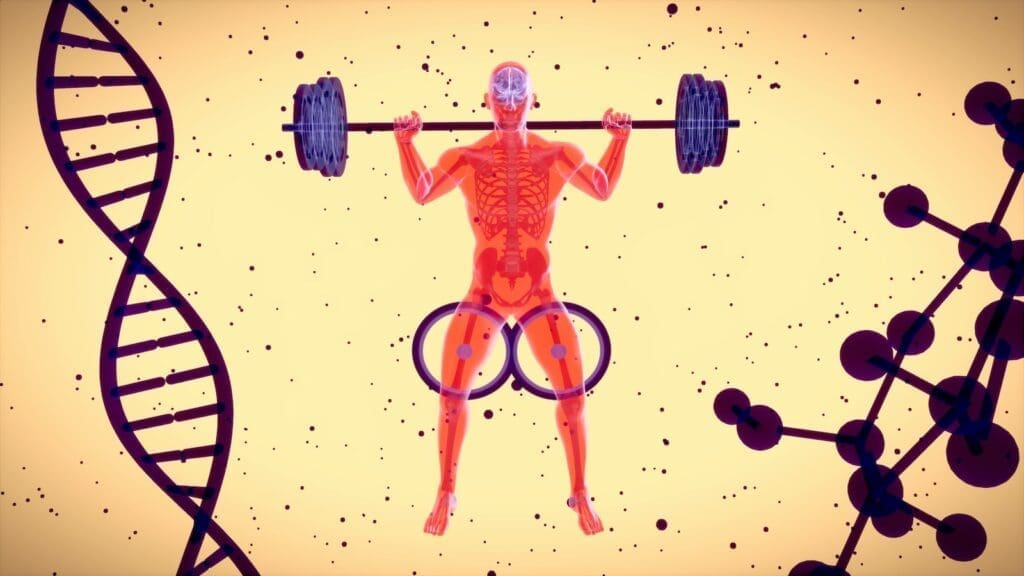Nutrigenomics is the scientific field that studies how genes and nutrition interact. It explains why certain people may have better responses to certain foods than others, as well as how genetic variants can influence an individual’s metabolism, energy expenditure, and overall health. For instance, variants on the FTO gene are associated with energy balance and weight management. Nutrigenomic testing helps to identify these variants and provides insight for an individual into what foods they should choose in order to maximize their healthy lifestyle.
The research behind nutrigenomics has extraordinary implications in terms of helping people make tailored diets and find specific types of treatment options. Analysing a person’s individual genome can help guide them towards making healthier dietary choices, and this approach could be especially useful for those who struggle with controlling their food intake or maintaining a healthy body weight. Ultimately, nutrigenomics shows great promise in helping to create personalized nutrition plans that could improve risk factors and prevent poor dietary choices in the future.
- Nutrigenomics: The Basics
- Nutrigenomics: The Genome–Food Interface
- How Nutrigenomics May Impact the Way You Eat
- How Does Nutrigenomic Testing Work?
- How Can Nutrigenomics Impact Your Diet?
- Is Nutrigenomics The Future of Nutrition?
- Nutrigenomics: 5 Facts About Your Genes, Diet and Health
- Use the Power of Nutrigenomics for Your Best Health
- Summary: What Is Nutrigenomics?
Nutrigenomics: an example
A great example of nutrigenomics is the way beta carotene, a plant-based nutrient found in fruits and vegetables like carrots, sweet potatoes, spinach, apricots, and cantaloupes is broken down and absorbed into our bodies.
Beta carotene is converted into Vitamin A in a two-step process which involves a special enzyme called BCO1. This enzyme, which is coded for by the BCO1 gene, breaks down beta carotene making it bioavailable to our bodies so that we can use it just like Vitamin A. So when you eat food rich in beta carotene such as carrots your body produces enough enzymes to break down the beta carotene into Vitamin A making it available for use by the body.
Nutrigenomics looks at this process on a deeper level to understand better how different levels of certain nutrients interact with genetic variation in order to produce optimal health within individuals.

Why should you care about nutrigenomics?
Nutrigenomics is the science of understanding the way that individuals absorb nutrients and break them down, on a genetic level. While it may look like a technical field, it has huge implications for how we should approach our diets. Since everyone’s DNA is slightly different, there isn’t one single dietary recommendation that works for all. Knowing more about nutrigenomics allows us to tailor our diets based on our individual makeup and health goals.
By taking into account nutrigenomics, we can get the most nutritional benefit out of food choices and combinations of foods. For example, certain people might need to avoid certain foods or eating certain combinations of foods at the same time because it can interfere with key nutrient absorption processes. There could also be variations in macronutrient ratios or types of fats that help specific individuals gain or lose weight more efficiently. There’s no one-size-fits-all approach when it comes to nutrition – its unique for every person. Understanding this concept through nutrigenomics helps ensure you receive all the nutrients your body needs for optimal health and wellness!
Unless you’re a nutrigeneticist, you don’t really need to quibble over the difference between nutrigenomics, nutrigenetics, and nutriepigenetics. The important thing to appreciate is that we don’t all respond the same way to the same dietary patterns, specific foods, and even certain forms of nutrients. Source: mygenefood.com
Nutrigenomics: The Basics
Nutrigenomics is a field of scientific research exploring the relationship between nutrition, the human genome and gene expression. Though much of the initial “hype” did not come to fruition, there is still potential for this field of science to rapidly progress in shaping personalized nutrition programs tailored to each individual’s distinct genetic makeup. It offers a holistic approach to nutrition, taking into consideration our individual characteristics such as age, sex, metabolism and gene types. This promising technology could have the power to predict certain predispositions and even prevent risks from occurring.
At the same time, nutrigenomics raises some ethical concerns concerning privacy and misusage of personal data that could be obtained through genetic testing. Regulators will have to balance safety with consumer choice on access related issues if personalized nutrition is to take over public health promotion efforts.
In conclusion, nutrigenomics is an expansive field of study with immense potential given its ability to both prevent illnesses and customize dietary plans accordingly.
Nutrigenomics: The Genome–Food Interface
Nutrigenomics has emerged as an interdisciplinary approach to the study of health due to its desire to unravel how the human genome interacts with environmental and lifestyle variables. As efforts to uncover the etiology of various disorders commonly involve exploring both nature and nurture, it is essential for these processes to be thoroughly examined in order to find comprehensive solutions. In this regard, nutrigenomics seeks to unveil the intricate relationship between food intake and genetic makeup by analyzing how components of the diet influence gene expression. The extent of the outcomes varies from individual to individual depending on their unique genetic makeup and culture-related dietary preferences.
Using genomic tools such as high-throughput sequencing techniques, nutrigenomics provides valuable insight into various cellular, molecular, biochemical, physiological, and epidemiological aspects related to diet-gene interactions. Essentially, combining genotypic information with extensive nutritional data allows researchers to identify potential dietary risk factors that drive various chronic conditions, enabling them to develop evidence-based diet-based strategies for preventive interventions.
Furthermore, nutrigenomics can provide alternatives for personalized nutrition plans tailored towards an individual’s own genetic makeup. Ultimately, understanding the genome–food interface holds great promise in furthering our knowledge.

Protandim
Discover the power of Protandim, a groundbreaking nutrigenomic supplement by LifeVantage. Boost your biohacking journey with this revolutionary product!
A Focus on Polymorphisms
Polymorphisms can be used to better understand the influence of macronutrients, micronutrients and bioreactive chemicals on gene expression. These biochemicals play a critical role in metabolic processes, including hormonal balance and immune response, as well as detoxification strategies and utilization of macronutrients for fuel. In addition, they act as ligands for transcription factors and signal transduction pathways that result in changes to gene expression. Furthermore, research suggests that genome instability due to nutritional deficiency can be a sensitive marker for this activity.
Michael Fenech from the CSIRO Genome Health and Nutrigenomics Laboratory has studied many of these polymorphisms to better understand how nutrients and chemicals influence gene expression. With a deeper appreciation of the relationship between nutrition and gene expression, scientists are uncovering ways to optimize dietary patterns with potential implications in reducing risks associated with inadequate food choices. While nutritional interventions remain controversial in some circles, cytokine-targeted therapies utilizing dietary bioactives may eventually become an important therapeutic strategy.

How Nutrigenomics May Impact the Way You Eat
The science of nutrigenomics can be an empowering tool in helping you figure out the best diet choices for your specific body and lifestyle. It uses our individual biochemistry to construct a nutrition plan that is tailored towards achieving personal health objectives. This type of personalized nutritional approach lets us identify the most effective solutions and dietary habits needed to reach our goals, regardless of what fad diets come and go.
Nutrigenomics builds on the idea that particular foods and nutrients have direct impacts on our genetic functioning as well as influencing various hormones. This opens up an exciting field whereby we can use our own specific biology to achieve health and performance goals through enhanced nutritionally-focused diet plans designed by registered dietitians.
Practitioners may use an array of test data, such as blood work or gene testing, to create a custom nutrition program aimed at promoting weight loss, risks prevention, improved athletic performance, or whatever you’re personally looking for. Nutrigenomics provides a level of clarity that goes beyond guessing at what might benefit one individual over another individuals when it comes to optimizing diets or seeking optimal wellness goals.
How Does Nutrigenomic Testing Work?
Nutrigenomic testing is a scientifically-backed way to determine your dietary needs based on your genetic makeup. By swabbing the inside of your mouth, a sample of DNA is collected and sent off for analysis to a lab. The results can take a few weeks to be returned but once they come through are incredibly detail oriented. Depending on which tests were run as part of the nutrigenomic diagnosis, the lab may check up to 70 different genes in order to best determine an individual’s nutrient related needs and always changing requirements.
Not only does this type of test reveal specific nutrients that you should aim for more or less of within the diet, but it may also point out potential health risks if any are present. Careful review of these results and any lifestyle changes suggested by nutritionists or physicians can be crucial for those looking to live a fuller life with their optimum health in mind.
With precision accuracy provided by Nutrigenomics, it has become much easier for people everywhere to maintain healthy habits tailored gently towards their own unique genetics.
Test accuracy
Nutrigenomic testing has been widely accepted for its accuracy and its ability to provide insights into potential health conditions or how an individual will respond to certain nutrients. Through the extensive body of research conducted in this field, it has become clear that many peoples’ predispositions regarding nutrition and health largely depend on their natural genetic makeup. By providing users with detailed information about their specific genetic profiles, nutrigenomic tests can accurately identify areas of dietary concern and suggest specific alterations for improvement.
Although nutrigenomic testing is very accurate, individuals should keep in mind that genes are not necessarily fate; although they may be predisposed to certain conditions or respond poorly to certain nutrients, it is not certain that these conditions will manifest at any point. Healthy lifestyles and proper diet adjustments could potentially prevent these negative effects from becoming a reality for the vast majority of people tested. Furthermore, since many risks take years to detect without testing, examinees should undergo regular examinations in order to stay informed about their bodies and observe any developments throughout time.
Over-the-counter nutrigenomic tests
Nutrigenomic tests are becoming increasingly popular among consumers looking for information about their health and dietary needs. These tests, which are available over-the-counter from various companies, can provide a lot of useful insights into an individual’s genetic makeup that can be used to improve the wellbeing of patients. However, it is important to understand that these tests should never replace seeking counsel from professional dieticians or healthcare professionals.
Registered dietitians with experience in nutrigenomics can take these results and explain how they relate to an individual’s health and well-being, such as explaining the significance of certain genetic variants in terms of increased risk factors like high cholesterol or triglyceride levels. They can then suggest dietary changes – such as adding more omega-3 fatty acids to reduce the likelihood of developing high cholesterol or triglyceride levels – that may help improve overall health without needing medication. This insight offers a unique opportunity for individuals looking to make positive changes in their nutrition and fitness regimes without the need for costly prescription drugs or treatments.

Collagen
Discover the power of collagen and how it can benefit your general health and well-being. Learn how LifeVantage’s advanced nutrigenomics approach and biohacking techniques can optimize collagen production in your body.
How Can Nutrigenomics Impact Your Diet?
Nutrigenomics is a relatively new science that can provide insights into how certain dietary factors may influence an individual’s health. This technology can help identify certain genetic variations in a person’s DNA, which allows for more personalized dietary recommendations to be made. As an example of how this technology can be used, if someone has the genetic variant associated with high blood pressure, they will know that their risk factor is higher and that they should take extra steps to monitor it and take preventive measures. One way to do this is by reducing the amount of sodium in their diet.
Having access to nutrigenomics information helps individuals make more informed dietary decisions based on particular genetic guidelines. Through the use of these personalized data points, people can match their unique genetic makeup up with specific lifestyle changes such as adjusting macronutrient ratios or focusing on antioxidants, in order to reduce their chances of developing chronic health issues and lead an overall healthier life. Consulting with a qualified nutrition professional has also been shown to reinforce motivation when taking action on health goals; since knowing one’s genetic details should help reaffirm that these changes are necessary and worthwhile thus increasing consistency in habits.
Genetics vs. lifestyle choices
The PREDICT 1 Study is a fascinating insight into how much our genetics vs. lifestyle factors contribute to our overall health. Taking a sample of 1000 participants, more than half of which were twins, researchers measured the sugar (glucose), insulin and fat levels in each participant’s blood after they had eaten specially designed muffins. This acted as a fundamental way to understand the impact of their genetics on their body’s responses to food.
In addition, the study also collected information about each participant’s amount of exercise and sleep. These two lifestyle choices have been shown to have an effect on metabolism, weight maintenance and general wellbeing too – key contributors to any individual’s overall health picture. As such, this study provides invaluable data which may unlock how much these external factors influence our health over what we are born with naturally (our genetics). Understanding this could be revolutionary for healthcare as both medical practitioners around the world and individuals may be better able to make informed decisions about their lifestyle choices for a healthier life balance.
Glucose, exercise and sleep, have been shown to have an effect on metabolism, weight maintenance and general wellbeing. By Nutriginomics Store
Is Nutrigenomics The Future of Nutrition?
Nutrigenomics, or the study of how our genes interact with food to affect our health, may well be the future of nutrition. Nutrigenomics allows for personalized nutrition by making recommendations based on a person’s genetics, personal preferences and predispositions that may not be relevant to others. This could eventually replace the one-size-fits-all approach that is currently used when providing dietary advice.
While nutrigenomics can provide more targeted advice on what steps you can take to feel your best, it is important to remember that genetic tendencies are only forecasts, not guarantees. Additionally, nutrigenomics cannot eliminate all of the trial and error associated with diet changes and supplement use for some users. Nonetheless, as people become increasingly familiar with their own genetic makeup, this science may become a regular part of making healthy nutrition choices in the future.

Nutrigenomics: 5 Facts About Your Genes, Diet and Health
Nutrigenomics is an emerging field which seeks to understand how our genes interact with diet in order to influence our health. The idea of being able to prevent risks through dietary changes has excited many, and nutrigenomics has been heralded as having the potential to have a major impact on lifestyle-linked illnesses and risks.
However, it has received some criticism and setbacks, such as a large European study which reported “no evidence that including phenotypic or genotypic information enhanced the effectiveness of (personalised nutrition) advice”. In addition, a 2015 meta-analysis of 38 genes available in commercial nutrigenomics tests yielded no statistically significant associations among them. Despite these speed bumps, there are five facts about nutrigenomics that everyone should know; genetic variability affects individual metabolisms; different diets can work for different people based on their genetics; not all nutritional guidelines suit everyone; nutrition tailored specifically for one person may lead to better health outcomes; and personalized nutrition could be an effective tool for general health and wellbeing in certain circumstances.
1. Nutrigenomics is a whole system approach
Nutrigenomics is a new and emerging field that explores how an individual’s genetic makeup influences their response to food and nutrition. It involves the study of how dietary components interact with an individual’s genetics to influence health outcomes including risks, vitality, and ageing. A major goal of nutrigenomics is to identify which dietary patterns are necessary for the optimal functioning of an individual and which should be avoided.
The main idea behind nutrigenomics is that each person has a unique nutritional needs based on their own genetics. This approach takes into account how nutrients are absorbed, metabolized, stored, converted from one form to another within the body and used by cells for energy production or other vital functions. The understanding of these processes at the molecular level can tell us what constitutes an individual’s optimal diet in terms of key nutrients and macronutrients. Furthermore, this knowledge can help researchers develop personalized plans that promote better health outcomes based on one’s individual genetic makeup. Nutrigenomics is also being used to investigate the potential benefits of polyphenol-rich foods and dietary supplements which may contribute to improving general wellness. As such, it holds great potential for improving public health initiatives around nutrition and preventive healthcare measures.
2. Nutrigenomics uses many types of tool to identify risks and progression
Nutrigenomics is a field of study that utilizes many different tools to identify risks and progression. Nutritional data can be collected via food diaries, biomarkers such as metabolite or hormone levels, genomics assays to identify genevariants that could explain certain observed behaviors, and clinical data such as age, weight, sex and BMI. All of this information can then be analyzed to determine how nutrition influences health outcomes in individuals.
For instance, the combination of dietary data and genetic information may allow researchers to understand why certain people respond differently to foods or supplements than others do. This understanding can help clinicians provide personalized treatment plans based on an individual’s nutritional sensitivity or risks. Additionally, nutrigenomics can be used to diagnose early stages of nutrient-related risks through identifying biomarker disruptions associated with the condition. Ultimately, nutrigenomics offers promising insights into how nutrition impacts health outcomes on an individual level and provides healthcare practitioners with powerful tools for personalizing care for each patient.
3. Nutrigenomics approaches are being applied to a wide range of conditions
Nutrigenomics is a rapidly evolving field that studies the interaction between genetics, nutrition, and health. As such, it has been applied to a wide range of conditions in order to identify how diet and lifestyle can affect one’s risk of developing health issues. One example of this application is that of metabolic syndrome, where specific genetic variants can be identified as enhancers or promoters of its development depending on the dietary and lifestyle factors chosen. Other areas where nutrigenomic approaches have been used includes links between gut microbiota, obesity and mental health, as well as the correlation between certain nutrients and risks such as coffee and cardiac irregularities.
As more research and technological advances are made in this field, nutrigenomics becomes increasingly feasible for individuals looking to determine their own personal risks for various health issues. What sets it apart from other approaches like traditional epidemiology, is that nutrigenomics provides valuable insights into how even subtle changes in our diets can play a role in the outcome of our overall health. With its broad applicability across multiple risks, nutrigenomics has become an invaluable tool both to the public at large as well as practitioners looking to give their patients personalized healthcare recommendations.
4. Nutrigenomics could be leveraged to offer personalized interventions
Nutrigenomics is an emerging field of science which uses the latest genetic technologies to personalize health interventions based on a person’s unique nutrition needs. By leveraging nutrigenomics, personalized interventions can be developed tailored to target and address specific nutritional deficiencies or poor metabolic responses to certain foods. For example, this technology could be used to identify individuals who are poor metabolisers of folate and provide them with targeted supplements to reduce the incidence of neural tube defects in pregnancy.
Nutrigenomics could also be employed as a tool to inform people about different types of diets that work best for them, depending on their particular genetic profile. For instance, someone looking to lose weight may choose between following a low fat diet versus low carbohydrate diet based upon their genotype; thus allowing for more precise dietary advice on which type of diet has the greatest potential weight loss benefits for that individual.
Additionally, nutrigenomics could be leveraged through personalised lifestyle interventions such as exercise security designs and creating individualized meal plans for optimal health outcomes based upon the person’s genotype. The ultimate goal is to improve one’s overall quality of life by managing one’s health through personalised nutrition recommendations appropriate for each individual’s needs.
5. It’s early days – and nutrigenomics is complicated
Nutrigenomics is a field of science aiming to explore the relationship between nutrition and gene expression, and how different diet patterns may affect certain health outcomes. While its potential has been recognized by scientists, it remains in its early stages, presenting several challenges that have yet to be solved.
Due to the complexity of the human body, understanding how biochemical pathways interact with nutritional components can be cumbersome. For instance, it is not always clear which tissues should be analysed in ‘omics’ assays, or which biomarkers should be used to measure the gene expression responses induced by nutrition. Additionally, although correlational studies have been successful at confirming links between nutrient intake and gene expression, the underlying causes remain largely unknown. Lastly, gathering reliable data from food and behavioural diaries often relies on self-reporting which can also present inaccuracies due to inadequate recall or insufficient effort.
Overall, nutrigenomics is still a developing field requiring further research before more meaningful conclusions are drawn. Despite these obstacles, current research continues to make great strides towards uncovering the complex relationships between nutrition and our biology.

Stacks
Experience the next level of general health and well-being with LifeVantage’s Stacks. Unlock your full potential and live your best life. Explore our products now!
Use the Power of Nutrigenomics for Your Best Health
Nutrigenomics is the answer to taking control of your health. Using cutting-edge science to analyze your unique genetic makeup, nutrigenomics helps you create a personalized nutrition plan that’s tailored just for you. It examines how certain nutrients interact with your body to identify the foods and supplements best suited for you. By uncovering insights about how genetics impacts our metabolism and immune system, nutrigenomics provides key information to help nourish your body optimally and get the most out of every bite.
Regardless of whether you’re looking to increase energy levels or reduce risks, nutrigenomics offers reliable guidance on how to make nutrition decisions based on your own personal health goals. With so much conflicting nutrition advice swarming around us these days, it can be difficult discerning between what’s right and wrong for us specifically. Nutrigenomics simplifies this process by taking into account our genetic profile as well as health history – giving us insight into the type of food we should eat for optimum performance.
How to Use the Power of Nutrigenomics
Nutrigenomics, or the power of personalized nutrition based on your unique genetic blueprint, is a vital tool for anyone who wants to begin their journey to optimal health. By understanding how genes interact with diet, nutrients can be used as targeted treatments to improve your well-being. In addition to providing you with specific information about ideal macronutrients and supplements necessary for good health based on your personal genetics, nutrigenomics can also help increase motivation and empowerment. It helps us move away from fad diets and emphasizes the importance of tailored nutrition for each individual person’s genetic makeup.
The two-way street between genes and food is an important one to understand when discussing nutrigenomics. What we eat can have both long-term and immediate effects on our gene expression—meaning that diet has the capacity to alter how these genes are expressed during certain moments in our lives. Just as knowing our DNA sequence will aid us in choosing which micronutrients are necessary for a healthy diet, dietary choices can help influence our genes in both positive and negative ways. The combination of using genomic testing (personalized DNA testing) alongside personal predetermined dietary science leads us closer towards obtaining the ideal nutritional plan specifically made for our own bodies.
Summary: What Is Nutrigenomics?
Nutrigenomics is the science of understanding how nutrition and genetics interact to influence our health. It examines how specific nutrients interact with your body’s unique genetic makeup to identify the foods and supplements that are best for you. By uncovering insights about how genes impact our metabolism and immune system, nutrigenomics helps us create a personalized nutrition plan tailored to our individual health goals.
Nutrigenomics also takes into account our genetic profile and health history, giving us reliable guidance on how to make the best nutritional decisions for optimum performance.




